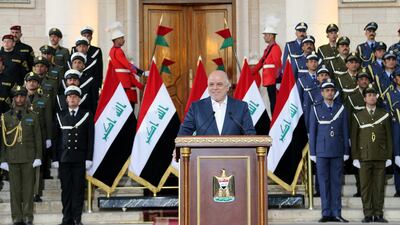Iraq on Saturday declared its war on ISIL was over after more than three years of combat operations drove the extremists from all of the territory they once held.
Prime Minister Haider Al Abadi said Iraqi forces were in full control of the country's border with Syria, the last area with any significant presence of the extremist group's fighters, and his spokesman said the development marked the end of the military fight against ISIL.
A senior military commander confirmed that combat operations had been completed.
"All Iraqi lands are liberated from terrorist Daesh gangs and our forces completely control the international Iraqi-Syrian border," Lt Gen Abdul-Amir Rasheed Yar Allah said in a statement released shortly after Mr Al Abadi's remarks.
The US-led international coalition against ISIL congratulated Iraq on the "significant victory" in an statement posted on Twitter. "We stand by the Iraqi people as they set the conditions for a secure and prosperous future," it said.
ISIL fighters overran nearly a third of Iraqi territory, including Mosul, the country's second largest city, in the summer of 2014.
Since then Iraqi ground forces backed by the US-led coalition have retaken all of that territory. However, ISIL fighters remain capable of carrying out insurgent attacks in Iraq, and the group has recovered from past setbacks.
Underlining the continued threat posed by the group, a unit of the Hashed Al Shaabi militias that have fought ISIL alongside Iraqi troops said on Saturday that they killed 10 militants found hiding in a tunnel near the city of Kirkuk.
Iraqi forces retook the last town held by ISIL — Rawah, near the border with Syria — in November. Over the following weeks Iraqi forces continued to clear patches of the country's vast western deserts.
In the most significant victory over the extremists, Iraqi forces retook Mosul earlier this year. Mr Al Abadi declared the fight for Mosul concluded in July, but clashes continued in the city for weeks afterward.
_______________
Read more:
US commander sees more battles before ISIL is beaten
Iraq finds reconciliation, not points of contention, in united battle against ISIL
US congress seeks to impose sanctions on Shiite militias in Iraq
_______________
Iraq now faces the daunting challenge of reconstruction. The fighting caused massive devastation in many areas, and some 3 million Iraqis are still displaced.
Baghdad also faces pressure over the future of Hashed Al Shaabi, which is comprised mainly of Iran-backed militias. Although now officially part of the government forces, they are seen by the United States and Gulf Arab states as a potential tool for Iranian plans to expand its influence in the region.
Last week, a powerful Iran-backed Iraqi militant commander was filmed visiting the Lebanon-Israel border and expressing support for the Lebanese and Palestinians against Israel.
Qais Al Khazali of the Iran-backed Asaib Ahl Al Haq, or League of the Righteous, a group that staged spectacular attacks against US troops before their withdrawal from Iraq in 2011, appeared in military uniform in a video while touring the border with Israel along with members of Lebanon's militant Hizbollah group, which is also supported by Iran.
The visit was condemned on Saturday by prime minister Saad Hariri, who called it a violation of Lebanese law and ordered that the commander be banned from entering Lebanon again.
The video was aired by Asaib Ahl Al Haq al Ahd TV station on Thursday night.

